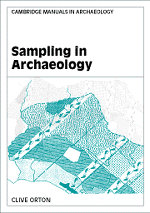Book contents
- Frontmatter
- Contents
- List of illustrations
- List of tables
- Acknowledgements
- 1 All the world's a sample
- 2 A little of what you fancy?
- 3 If this is the sample, what was the population?
- 4 Covering the ground
- 5 What's in a site?
- 6 The answer lies in the soil
- 7 ‘But many sanguine people hope, to see them through a microscope’
- 8 ‘In its depths, what treasures’
- 9 Beyond random sampling
- Appendix
- Bibliography
- Index
1 - All the world's a sample
Published online by Cambridge University Press: 05 June 2012
- Frontmatter
- Contents
- List of illustrations
- List of tables
- Acknowledgements
- 1 All the world's a sample
- 2 A little of what you fancy?
- 3 If this is the sample, what was the population?
- 4 Covering the ground
- 5 What's in a site?
- 6 The answer lies in the soil
- 7 ‘But many sanguine people hope, to see them through a microscope’
- 8 ‘In its depths, what treasures’
- 9 Beyond random sampling
- Appendix
- Bibliography
- Index
Summary
Introduction
Reading almost any archaeological document, from a research proposal to a fieldwork report, it will not be long before one comes across the word ‘sample’ in one context or another. A project, whether at regional or site level, will be based on a sampling strategy, a research design may specify that features are to be sampled, and samples of various types will be taken for the delight or otherwise of specialists who wish, or who can be persuaded, to look at them. In fact, almost all archaeology involves sampling; indeed, one could say that there is a sense in which much of archaeology is sampling, echoing David Clarke's remark that ‘Archaeology … is the discipline with the theory and practice for the recovery of unobservable hominid behaviour patterns from indirect traces in bad samples’. (Clarke 1973, 17).
The word sample is all-pervasive, but one soon comes to realise that it does not have the same meaning each time it occurs. This is not surprising, as just one of the six definitions given by the Oxford English Dictionary is broad enough to encompass a wide range of meaning: ‘a relatively small quantity of material, or an individual object, from which the quality of the mass, group or species, etc. which it represents may be inferred’. At one extreme, one may encounter a ‘multi-stage probabilistic sampling strategy’, while at the other, one may encounter the casual use of the word sample to refer to collections of muddy objects in plastic bags.
- Type
- Chapter
- Information
- Sampling in Archaeology , pp. 1 - 13Publisher: Cambridge University PressPrint publication year: 2000



